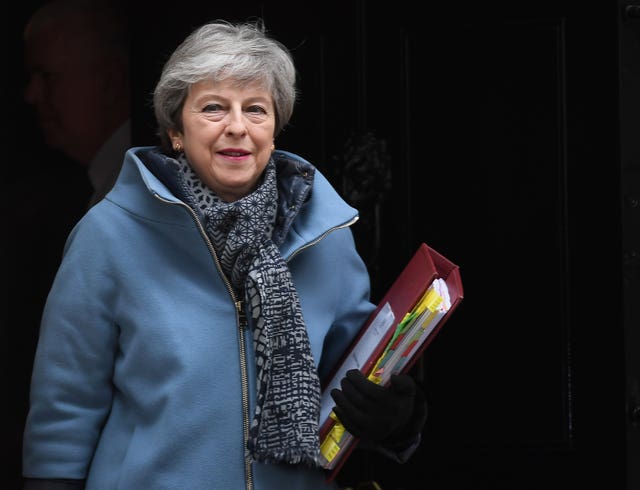
Theresa May is battling to get her Brexit Withdrawal Agreement backed by the Commons on the day that was scheduled to see Britain quit the EU.
The Prime Minister split the legally binding treaty segment of her Brexit deal from the declaration on future relations with the EU in order to ensure MPs could vote on it on Friday.
But Mrs May faced an uphill struggle as key Government allies the DUP joined Labour leader Jeremy Corbyn in saying they would vote against the move.
The PM’s decision to present just the Withdrawal Agreement to the Commons means it is not a third attempt to pass a “meaningful vote” on the Government’s Brexit deal and complies with rules laid down by Commons Speaker John Bercow.

Under the terms of an agreement with Brussels, if passed by MPs on Friday the vote would qualify the UK to be granted an automatic delay to May 22 of the formal date of Brexit.
Mrs May’s move allows the Government to present the situation as a choice between a short delay to Brexit and the potential for a much longer one which would mean taking part in European Parliament elections.
But it would not let Parliament go ahead and ratify the withdrawal deal, as Brexit legislation allows this only after the passage of a “meaningful vote” on both the Withdrawal Agreement and a Political Declaration on the future relationship.
DUP Westminster leader Nigel Dodds said his party could not back the Withdrawal Agreement because the Government had failed to win legally binding changes regarding the controversial “backstop” customs arrangements for the Irish border.
Mr Corbyn told the PM in a 20-minute telephone discussion on Thursday that he would not support the move as it represented a “blindfold Brexit”.
However, Downing Street is hoping that the move to split off the agreement will win support from Labour backbenchers.
One potential way for the PM to woo Labour MPs might be to accept an amendment tabled by Stoke-on-Trent Central’s Gareth Snell and signed by Lisa Nandy, Frank Field, Ivan Lewis, Caroline Flint, Rosie Cooper, Ruth Smeeth and Melanie Onn, which would give Parliament the power to set the negotiating mandate for talks on the future relationship.
Other amendments, tabled by SNP MPs, call on Mrs May to halt Brexit altogether by revoking the UK’s Article 50 letter or to make EU withdrawal dependent on the approval of the Scottish Parliament and Welsh Assembly.
Ms Flint said she would back the Government, telling the BBC: “I actually think this is a positive move and I will be supporting the motion for the Withdrawal Agreement.
“Lots of people have problems with the Political Declaration, but they don’t, actually, have much disagreement with the Withdrawal Agreement.”
Mr Dodds said: “We will be voting against the Withdrawal Agreement because the concerns that we have about the trade border between Northern Ireland and the rest of the United Kingdom, and what that would mean in terms of who makes our laws – not Stormont or Westminster – those concerns remain.”
Despite Mrs May winning the backing of some members of the hardline European Research Group (ERG) of Tory MPs after she said she would stand down as PM if she gets her deal through Parliament, a number of Conservative Eurosceptics have refused to budge.
Sir Bill Cash told the BBC: “The Prime Minister’s deal is not Brexit.”

But former Tory leader Iain Duncan Smith said he would now support the divorce deal and hoped that a successor to Mrs May who believed in Brexit would take over the future negotiations.
He told BBC Radio 4’s Today programme: “I think it’s time for us to take a decision, which is we want to leave, we want to be able to say to our constituents ‘We have left, there is more that has to be done’.
“A new leader can therefore take that forward and a leader who really believes in Brexit, because the problem has been that the negotiations have been conducted under the idea that this is a damage limitation exercise.”

If the motion on the Withdrawal Agreement is rejected by MPs, the UK will have until April 12 to ask for a further extension to Brexit negotiations – which would require voters to choose new MEPs – or leave the EU without a deal.
The vote comes on the day that pro-Brexit protesters are set to gather outside Parliament to mark what had been scheduled to be the UK’s exit date from the EU.
Meanwhile, Sir Oliver Letwin has tabled his business motion to continue the indicative votes process on Monday to consider Brexit deal alternatives.
The motion also raises the potential for a third round on Wednesday.


Comments: Our rules
We want our comments to be a lively and valuable part of our community - a place where readers can debate and engage with the most important local issues. The ability to comment on our stories is a privilege, not a right, however, and that privilege may be withdrawn if it is abused or misused.
Please report any comments that break our rules.
Read the rules here